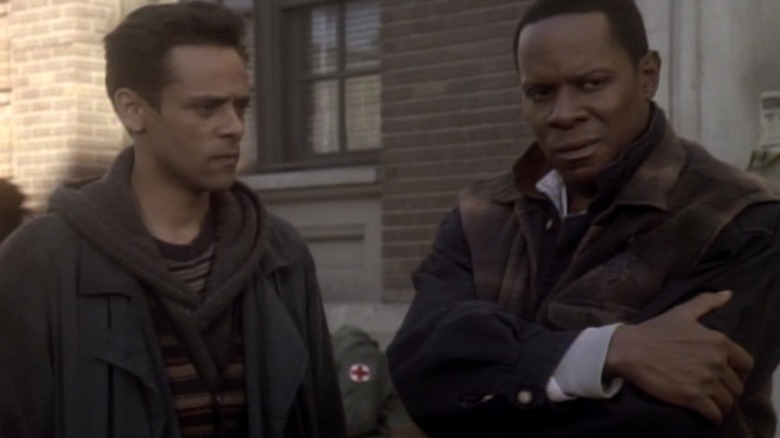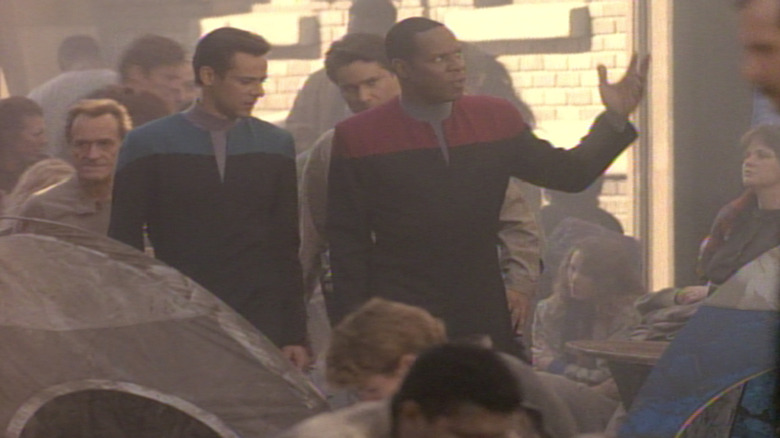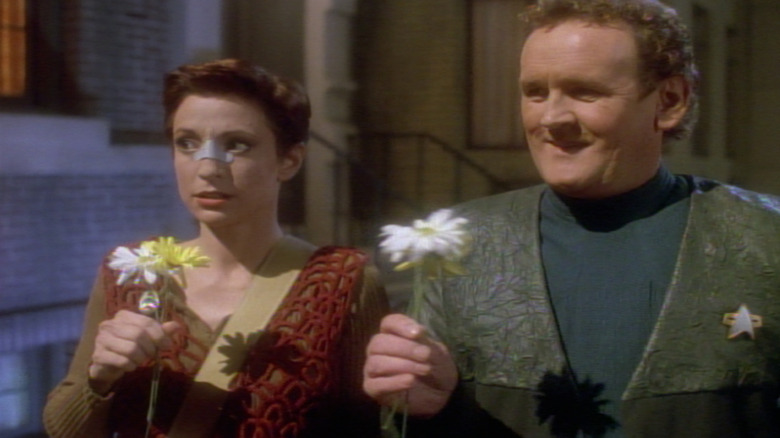One Of Star Trek's Darkest Storylines Is Set In 2024 — And It's Starting To Happen In Real Life
Although "Star Trek" takes place in an ostensibly utopian future free from war, want, money, and discrimination, the show's original creator, Gene Roddenberry, felt that humanity required a reckoning before that utopia could begin. According to "Star Trek" lore, Earth would have to nearly destroy itself in a series of devastating wars before the scant survivors would be able to pick themselves up, construct faster-than-light travel, and prepare themselves to meet their closest alien neighbors. The original "Star Trek" takes place about two centuries after the end of World War III, giving humankind a chance to rebuild itself into a utopia.
Back in the 21st century, however, not everything was rosy. Indeed, the two-part "Star Trek: Deep Space Nine" episode "Past Tense" (January 2 and 9, 1995) threw its main characters back in time — via a transporter accident — to the year 2024 when everything seemed to be at its worst. Earth in 2024 was overrun with poverty, and Captain Sisko (Avery Brooks) had to explain to Dr. Bashir (Alexander Siddig) that housing insecurity had reached epidemic proportions. Indeed, the population of unemployed and unhoused people in major cities had reached such high levels, that the American government had built special "Sanctuary Districts" where the unhoused were rounded up and imprisoned in a ghetto.
The mentally ill weren't treated, and the hungry were fed with a malfunctioning rationing system. It wouldn't be until an activist named Gabriel Bell rose up in protest and led a riot against the police that conditions would change. The Bell Riots were said to be a significant part of Trek's history.
Given the recent news that Governor Gavin Newsom has signed an executive order to sweep the state of unhoused encampments, "Past Tense" — set in 2024 — is beginning to feel weirdly prescient.
Newsom's plan
Housing insecurity and homelessness, it should be said, is a serious problem in California. Rents are high, and there is little effort made to provide low-cost housing or shelters for the state's many unhoused citizens. At last count, there were over 181,000 unhoused people in the state, 28% of the entire country's unhoused population. Many people live in tents, often set up under freeways or other sheltered areas, and form miniature encampments. There is little sanitation in such encampments, and the quality of life isn't great. Every so often, the police department is called in to sweep these encampments off the streets, forcing the people to move on to another neighborhood. However, they are not taken to shelters but merely told to go elsewhere. They then set up camps under another freeway and the cycle continues.
On July 25, Gavin Newsom signed an order that would only exacerbate the problem, an order stemming from a Supreme Court Decision that allowed states to ban public sleeping at their own discretion. While Newsom has pledged billions of dollars to build shelters, the measure to "sweep the streets" of encampments has been called a wanton and unhelpful measure by critics.
It's a strange coincidence that "Star Trek" should have written a story, back in 1995, about how 2024 will be the year the housing insecurity problem in the United States will boil over. Gavin Newsom has essentially signed a measure that opens the door for the cruel "Sanctuary Districts" seen in "Deep Space Nine." If Newsom is a "DS9" fan, he seems to have taken the wrong lessons from "Past Tense."
The political precedent
The remaining plot of "Past Tense" is the stuff of classic TV drama. Sisko is accosted, and a random man standing nearby comes to his aid. The man is killed in the confrontation. Sisko finds that the dead man was actually Gabriel Bell, the man destined to rise up against the corrupt police state. Sisko, knowing the significance of the Bell Riots from his history books, chooses to step into Bell's shoes and start the riots himself. In so doing, however, he may die, the same way Bell did.
On the DVD commentary track for "Past Tense," the episode's writers — Robert Hewitt Wolfe, Ira Steven Behr, and René Echevarria — said they were inspired by a previous mayor's actions. The Republican Richard Riordan (who was mayor of Los Angeles from 1993 to 2001) suggested in the early 1990s that the city build what he called "havens" for the city's homeless, essentially herding them into tent cities. Riordan said he wanted to keep the streets clear because it was good for local businesses, but he never suggested how these fenced-off "havens" were meant to be run, or how the homeless insides of them were to be helped.
The writers of "Deep Space Nine" were trying to invent a fictional, near-future scenario where the world was too far gone to save. Outside their windows, politicians were merely suggesting it in real life.
While Newsom's new measure doesn't spell out the same kind of "havens" that Riordan suggested, it is uncanny that the new homelessness measures should come tumbling down the pipeline in 2024, when "Past Tense" takes place. We'll have to wait to see if Gabriel Bell is also real. It's starting to feel like it.


